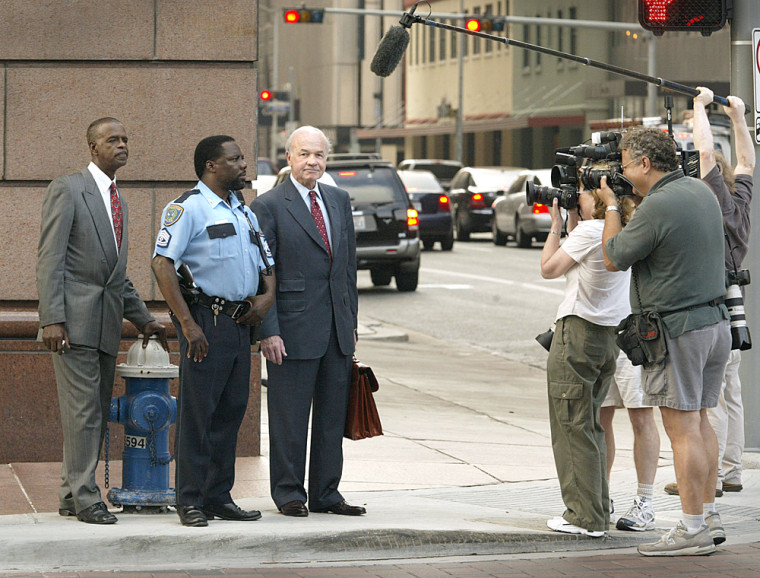A personal accountant to Enron Corp. founder Kenneth Lay testified Monday she was unaware when she transferred money from loans Lay had obtained that federal regulations barred use of some of the money for stock purchases.
Sherrie Gibson, contradicting her own grand jury testimony, said sometimes she decided herself which of Lay's mutliple lines of credit to use.
"It's not accurate to say he told me every time," she said, testifying in the second day of Lay's bank fraud trial.
After testifying that prosecutors made her feel pressured to say that Lay always picked the lines of credit for stock purchases, Gibson added that she did not intend her actions to be deceptive.
"I never think in terms of sneaky," she said under cross examination.
Gibson earlier testified in a grand jury investigation of Lay before his 2004 indictment on one charge of bank fraud and three charges of making false statements on loan documents.
The trial is being heard without a jury by U.S. District Judge Sim Lake, who also has presided over the four-month-long fraud and conspiracy trial of Lay and former Enron Chief Executive Jeffrey Skilling. Jury deliberations in that case were continuing for a third day as evidence was being presented in the bank fraud case.
Defense lawyers said Lay, who took the stand in the main case, again would be testifying in his own defense in this case, likely by the end of the day.
Prosecutors allege that beginning in 1999, Lay obtained $75 million in loans from three banks _ Bank of America, Chase Bank of Texas and Compass Bank _ and then reneged on an agreement with the lenders that he wouldn't use the money to carry or buy stock. Under federal rules adopted after the 1929 stock market crash, only 50 percent of a loan can be used to buy stock or mutual funds.
Gibson said she was unaware of the rules and neither Lay nor his banker told her about them. She also said Lay never told her to circumvent any regulations.
"First I would look at the interest rate and if those were all equal, I'd also look at availability," she said of her decision-making on which of Lay's lines of credit to tap. "I would look to see how much was left, to see how much to draw down on each line.
"If everything was equal and I was trying to leave a cushion, I'd also see who was the last bank we would do business with... If we hadn't used one bank for a while, then I'd use that bank."
Lay signed documents agreeing to loan rules but violated them repeatedly, the government says. Conviction on each of the four charges carries up to a 30-year prison term. Lake has said he won't announce his verdict in the case until the jury has announces its verdict in the larger case.
Gibson testified to the grand jury that she never moved Lay's money from one account to another without his approval.
But on Monday she testified in response to questions from one of Lay's lawyers that she felt intimidated during the grand-jury appearance by John Hueston, a prosecutor with the federal Enron Task Force, who she said raised his voice with her.
"I felt like I was the one on trial and that I had done something wrong," she said.
Pressure from prosecutors on witnesses is a key plank of the Lay-Skilling defense in the main Enron trial.
Lay's lawyers last week questioned the legitimacy of the bank documents containing the loan terms by suggesting the loan agreements actually were signed by an automatic signature device in Lay's office and not by him. On Monday, they again objected to documents allowed into evidence that carried his signatures.
Lay had no motive to violate rules, had collateral to back up the loans, paid them in full and would have complied with rules if he had known there was a problem, his attorney has said.
The banking case originally was part of the July 2004 conspiracy indictment against Lay and Skilling. But Lake, ruling in October 2004 on a request by Lay to have his case heard separately, said only that the four counts would be tried separately.
